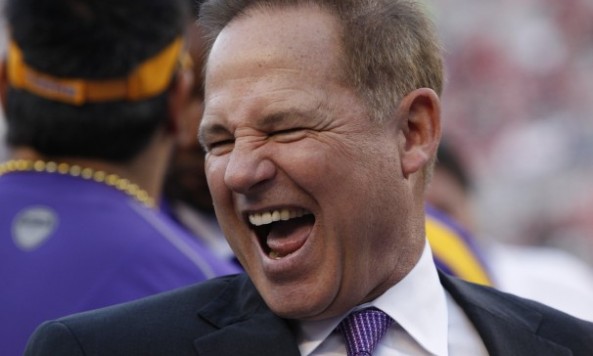Coaching college football is serious business.
Coaching college football in the SEC is almost a sacred trust.
You would think that in a billion-dollar industry, coaches — if they felt they couldn’t personally handle the task of managing endgame situations — would make a relevant adjustment. You’d think that coaches would delegate the responsibility to an assistant or, in a move which hasn’t yet happened (but SHOULD), create a new position for a game management assistant.
This would be akin to Brad Stevens hiring Drew Cannon as an assistant for analytics, the college (and now pro) basketball version of what Oakland Athletics general manager Billy Beane pioneered in baseball (as portrayed in the book and movie, Moneyball). When you’re immersed in the business of winning games, you mobilize the resources to give yourself every possible (legitimate, ethical) advantage.
Why the college football coaching profession hasn’t yet adopted the practice of putting game-management assistants on staff, I don’t know.
Saturday night’s LSU-Mississippi State game showed why such assistants are necessary, now more than ever.
*
With Mississippi State, one has to acknowledge that when a coach is so closely tethered to the twin tasks of calling plays and working with his offensive coordinator to generate the right play in a crucial situation (two-minute drill, end of game, at the LSU 30-yard line), he can lose track of time clocks, either the game clock or the play clock.
Perhaps this might become an epiphany for Dan Mullen, an event which leads him to realize that he should hire a game-management assistant. However, in the absence of that epiphany, it falls upon Mullen as the head coach to make sure that his team doesn’t take a delay of game penalty when trailing by two points. Mullen was so concerned with the kind of play Dak Prescott was about to initiate that he lost track of the fact that Prescott had neglected the play clock.
Yes, Prescott — as a veteran quarterback — certainly shares blame for the situation. If this was a rookie quarterback, one would place even more of a burden on the head coach to intervene, but since Prescott has been around the block before, it’s at least somewhat understandable that Mullen totally trusted him to get the play off in time. Nevertheless, we’re reminded that this is college and not the NFL. It’s still an emotional game played by younger men, and since the head coach gets a paycheck while the players don’t, the head coach does have to step in and call that timeout with one second left on the play clock if his quarterback isn’t on top of the situation.
Those five lost yards turned a 47-yard kick into a 52-yard kick, and anyone who has followed football at either the college or pro levels knows that the 47-to-52-yard range is when many (if not most) kickers begin to miss more kicks than they make. Mullen played a central role in losing that game for his team.
The coach on the other side also handled that endgame situation poorly, but everything worked out all right… because Les Miles, that’s why.
*
Miles broke each of the fundamental rules of late-game kicker icing:
1) Ice on short or medium kicks, not long ones. Icing before a long kick can allow the kicker to gear up for the long boot and devote extra attention to the effort. It’s the short or medium kick in which you want the kicker to think about the attempt:
“Hey, I got this, this is cake. No sweat.”
“Of course I’m going to make this 34-yarder.”
“I’ve done this a million times in practice.”
“I know exactly what to do if anything goes wrong.”
“Wait a minute, what if something DOES go wrong?”
You want a kicker to think long enough that a voice in the head might distract him from what should be a relatively easy kick. The long boot is less likely to be made if it’s rushed, executed in a hurry-up scramble.
2) If you ice, MAKE SURE THE KICKER DOESN’T GET IN A PRACTICE KICK. This is what torched the Seattle Seahawks in their divisional playoff loss to the Atlanta Falcons a few seasons ago. Coaches who ice have to make sure they call the timeout early enough to prevent the snapper and holder from working in concert to give their kicker a little bit of practice. Miles did not do this against Mississippi State, but he was fortunate that the distance was five yards longer than it should have been… because of Dan Mullen.
For a primer on how to ice kickers, consult this article we wrote last December.
*
When a coach in the Mountain West or Conference USA makes an endgame-management mistake, it’s generally not national news. When these failures occur on both sides of an SEC game, it should be a big deal. Will the college football coaching industry move toward game-management assistants?
It should… but that would require common sense, which was lacking at the end of the LSU-Mississippi State game.

